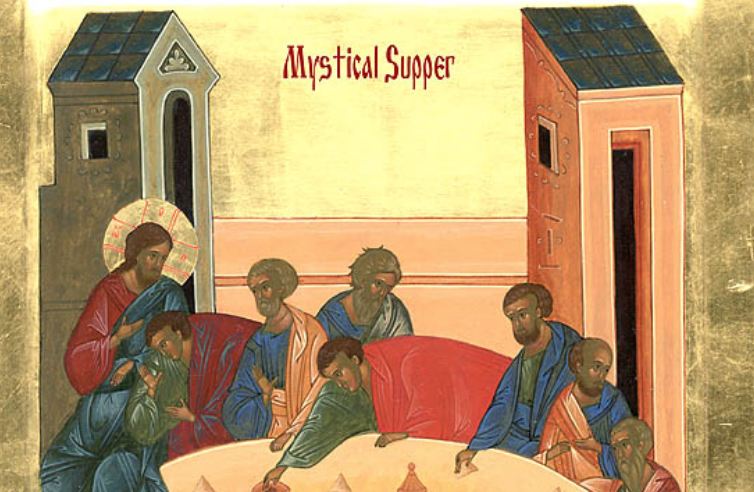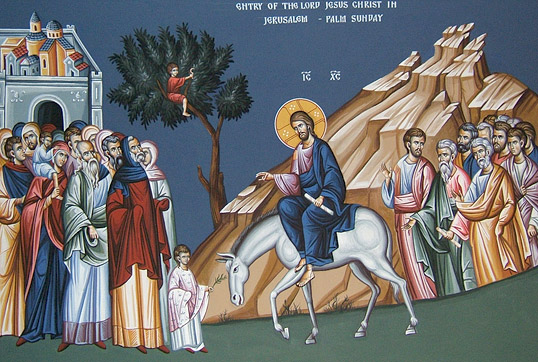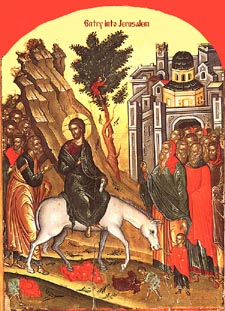Judas stretched forth his hand to the lawless. She sought the remission of her sins, while he took the pieces of silver. The harlot brought myrrh to anoint the Lord; the disciple made an agreement with the lawless. She rejoiced when she spent the precious myrrh; he set out to sell Him who has no price. She recognized her Master, while he departed from his Master. She was freed from sin, but he became the captive of sin.
Great and Holy Thursday
 THURSDAY: The Last Supper
THURSDAY: The Last Supper
Two events shape the liturgy of Great and Holy Thursday: the Last Supper of Christ with His disciples, and the betrayal of Judas. The meaning of both is in love. The Last Supper is the ultimate revelation of God’s redeeming love for man, of love as the very essence of salvation. And the betrayal of Judas reveals that sin, death and self-destruction are also due to love, but to deviated and distorted love, love directed at that which does not deserve love. Here is the mystery of this unique day, and its liturgy, where light and darkness, joy and sorrow are so strangely mixed, challenges us with the choice on which depends the eternal destiny of each one of us. “Now before the feast of the Passover, when Jesus knew that His hour was come... having loved His own which were in the world, He loved them unto the end...” (John 13:1). To understand the meaning of the Last Supper we must see it as the very end of the great movement of Divine Love which began with the creation of the world and is now to be consummated in the death and resurrection of Christ.
On the Passion of Christ and the Book of Job
 The Old Testament is revealed in the New Testament. The Book of Job reveals its meaning in an amazing way. It is read during the church services during Great Lent. This book prepares us to meet with the Suffering and Risen Christ.
The Old Testament is revealed in the New Testament. The Book of Job reveals its meaning in an amazing way. It is read during the church services during Great Lent. This book prepares us to meet with the Suffering and Risen Christ.
Homily on Palm Sunday
 Rejoice greatly, O daughter of Sion; proclaim it aloud, O daughter of Jerusalem; behold, the King is coming to thee, just, and a Savior; he is meek and riding on an ass, and a young foal (Zach. 9:9).
Rejoice greatly, O daughter of Sion; proclaim it aloud, O daughter of Jerusalem; behold, the King is coming to thee, just, and a Savior; he is meek and riding on an ass, and a young foal (Zach. 9:9).
Lazarus Saturday and Palm Sunday
 The week following the Sunday of Saint Mary of Egypt is called Palm or Branch Week. At the Tuesday services of this week the Church recalls that Jesus’ friend Lazarus has died and that the Lord is going to raise him from the dead (Jn 11). As the days continue toward Saturday, the Church, in its hymns and verses, continues to follow Christ towards Bethany to the tomb of Lazarus. On Friday evening, the eve of the celebration of the Resurrection of Lazarus, the “great and saving forty days” of Great Lent are formally brought to an end:
The week following the Sunday of Saint Mary of Egypt is called Palm or Branch Week. At the Tuesday services of this week the Church recalls that Jesus’ friend Lazarus has died and that the Lord is going to raise him from the dead (Jn 11). As the days continue toward Saturday, the Church, in its hymns and verses, continues to follow Christ towards Bethany to the tomb of Lazarus. On Friday evening, the eve of the celebration of the Resurrection of Lazarus, the “great and saving forty days” of Great Lent are formally brought to an end:
Having accomplished the forty days for the benefit of our souls, we pray to Thee, O Lover of Man, that we may see the holy week of Thy passion, that in it we may glorify Thy greatness and Thine unspeakable plan of salvation for our sake . . . (Vespers Hymn).






